news
Breaking : At last, FG and Labour agree on ₦70,000 as minimum wage
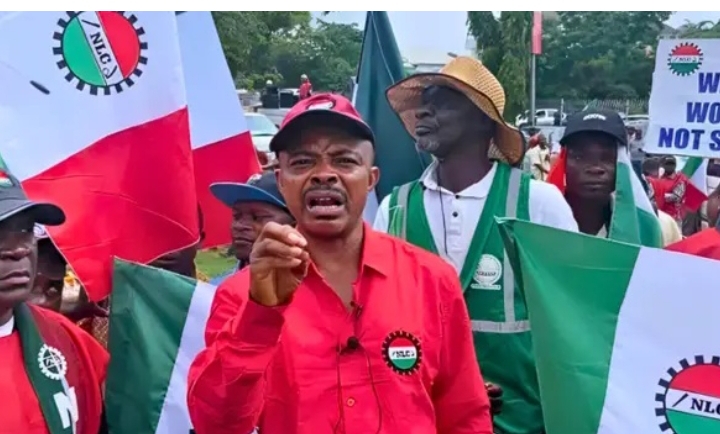
 In a landmark development, the Federal Government and Organised Labour have agreed on a new national minimum wage of N70,000, a significant increase from the current N30,000.
In a landmark development, the Federal Government and Organised Labour have agreed on a new national minimum wage of N70,000, a significant increase from the current N30,000.
The newly agreed minimum wage was reached on Thursday when President Bola Ahmed Tinubu met with the leadership of the organized Labour, led by presidents of the Nigerian Labour Congress (NLC) and the Trade Union Congress (TUC) at the State House, Abuja, the second meeting within a week.
Before reaching the agreement, the two sides, being government and the organised private sector on one side, and the organised Labour on the other, had held a long-drawn series of negotiations, starting with the Constitution of the Bukar Goni-Aji-led Tripartite Committee on New National Minimum Wage.
While the negotiations were ongoing, the employers’ side (federal/sub-national governments/OPS) had offered varying amounts, starting with ₦48,000 to ₦54,000 to ₦57,000 to ₦60,000 to ₦62,000 and finally to the agreed ₦70,000.
On the side of Labour, the leadership of the workers started negotiation with a demand for ₦615,000 then lowered it further to ₦500,000 to ₦497,000 to ₦250,000 and finally agreed to ₦70,000.
However, disclosing details of the meeting and the final agreement to journalists at the State House, Abuja, the Minister of Information and National Orientation, Mohammed Idris, described the conclusion of the meeting as “a happy day for Nigeria”.
Read Also: NLC urges FG to pay SSANU, NASU withheld four-month salaries
According to Idris, besides the agreement to the ₦70,000 minimum wage, the government has also agreed to addressing the disagreement over the withheld salaries of university workers’ unions; the Senior Staff Association of Nigerian Universities (SSANU) and the Non-Academic Staff Union of Universities (NASU).
The government has also pledged massive investments in infrastructure and renewable energy, including the acquisition of more CNG buses to enhance Nigeria’s transition to cleaner energy, as well as expressing commitment to ensuring local government autonomy.
“Today’s a happy day for Nigeria. You’ll recall that last week we had a meeting here and the organized private sector. The sub-nationals have also held their various meetings with Mr. President following the submission of the tripartite agreement to Mr. President. Labour came last week, they had meetings with Mr. President, they asked for adjournment for a week to go and consult further. They did those consultations, they have come back today and we have met with Mr. President.
“We’re happy to announce today that both the federal government and organized Labour have agreed on an increase on the N62,000 minimum wage. The new national minimum wage that we expect Mr President to submit to the National Assembly for legislation is N70,000. But that is not all. There is also a boost, like Mr. President has assured, in ensuring that massive investment is going to be made in the area of infrastructure.
“There is also a deepening of the investment of the federal government in renewable energy. More money is going to go into the acquisition of more CNG buses, Nigeria is going to be more CNG compliant, according to the President. We’re moving in this transition to renewable and all other things that Mr. President has assured Labour; the issue of SSANU and NASU is also going to be looked at.
“We are happy, we are very thankful of the role that the Organised Labour has done today. They recognised the federal government’s role in ensuring that we have the local government autonomy, in also ensuring that both the Organised Labour and the government are on the same page today. They have seen the magnanimity of the President and today the leadership of Labour said they didn’t come here for negotiation, not at all. They came here in their deep sense of patriotism to ensure that Nigeria remains united, Nigeria becomes more prosperous.
“It is in that spirit that they are in agreement with what the federal government has done today. We want to thank Labour for their patriotism. We also want to thank Mr President, the federal government, the sub-nationals and organized private sector for going through this painstaking effort, by also ensuring that at the end of the day Nigeria is the winner for it all”, Idris said.
Corroborating the Information Minister’s brief, the Minister of State for Labour and Employment, Nkeiruka Onyejeocha, announced that organized Labour has agreed to the new minimum wage of N70,000 after the meeting with President Tinubu.
The agreement comes after labour leaders requested a one-week extension to consult with their members, following their initial meeting with the President last week.
According to Onyejeocha, the President adopted a fatherly approach, emphasizing the need for a review of the minimum wage policy every three years, rather than the current five-year cycle.
She further hinted that the President also directed the Minister of Finance and Coordinating Minister of the Economy, Wale Edun, and the Minister of Budget and Economic Planning, Abubakar Bagudu, to review the issue of SSANU and NASU payments, with a waiver to pay the outstanding amounts.
She also said the President reassured Nigerians of his commitment to the country’s economic recovery and the welfare of citizens.
President of the NLC, Joe Ajaero, said the Organised Labour agreed to the new national minimum wage of N70,000 because of the President’s willingness to review wages every three years, rather than the usual five-year cycle.
While acknowledging the economic situation, Ajaero expressed mixed feelings about the agreement but noted that the NLC will take the proposal back to their constituency for further discussion and buy-in.
The agreement marks a significant step forward in the ongoing negotiations between the government and labour leaders, with a promise of future reviews and incentives like the CNG scheme to alleviate the burden on Nigerian workers.
“Well, we’re here last week and we’re here now, what they have announced in terms of the amount of N70,000 happened to be where we are now for now, but the good thing about it is that we will not wait for another five years to come and review, rather than settling on a figure that we’ll wait for five years, it’s like we’ll have to now negotiate even two times within five years, with a view to going up. That is one of the reasons why we decided to reach where we are today, because of the proviso that we can review in the next three years.
“We came with other issues in the basket, like the issue of SSANU, NASU and others, especially with the affront by the Commissioner of Police of FCT, we brought it to Mr. President, and talked on the need for that matter to be addressed and magnanimously, he asked the agencies concerned to work out the modalities for the payment of those workers in the universities.
“So far, that’s where we are. Although he promised some incentives like the CNG, which will lessen the burden that the Nigerian workers are passing through, but you can see that we are taking in this with mixed feelings because of the situation of the economy, we will have to move ahead despite the situation and the negotiation can linger. Coming from 62 to 70 and then with the promise that we’ll come back soon to negotiate it.
“We’re taking it back to our constituency to see how we can get a buy-in. So that’s what has transpired this afternoon”, he said.
The TUC President, Festus Osifo, who also spoke to journalists, expressed satisfaction with President Tinubu’s intervention, especially with the proviso for review every three years.
He also commended the President’s promise to address the issues of SSANU and NASU, and emphasized the need for swift passage of the minimum wage bill by the National Assembly and urged that the student loan scheme be targeted at those who need it most, not just the children of the rich.
news
BREAKING: Tinubu Names Tunji Disu Acting Inspector General After Egbetokun’s Exit

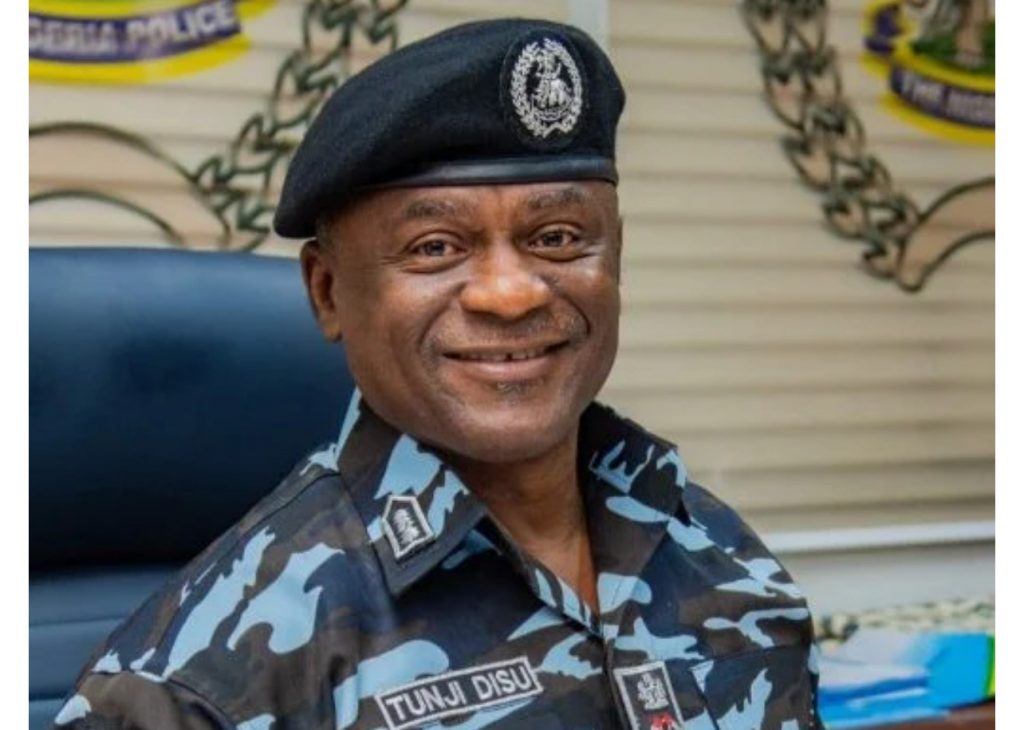
President Bola Tinubu has accepted the resignation of the Inspector-General of Police, Kayode Egbetokun, and approved the appointment of Tunji Disu as Acting Inspector-General of Police with immediate effect.
Our correspondent had earlier reported that Egbetokun tendered his resignation letter on Tuesday, citing pressing family considerations.
Appointed in June 2023, Egbetokun was serving a four-year term scheduled to conclude in June 2027, in line with the amended provisions of the Police Act.
In a statement issued on Tuesday by his Special Adviser on Information and Strategy, Bayo Onanuga, the President received the letter earlier on Tuesday and expressed appreciation for his service to the nation.
He also commended Egbetokun’s “decades of distinguished service to the Nigeria Police Force and the nation,” acknowledging his “dedication, professionalism, and steadfast commitment to strengthening internal security architecture during his tenure.”
“In view of the current security challenges confronting the nation, and acting in accordance with extant laws and legal guidance, President Tinubu has approved the appointment of Assistant Inspector-General of Police Tunji Disu to serve as Acting Inspector-General of Police with immediate effect.
“The President is confident that AIG Disu’s experience, operational depth, and demonstrated leadership capacity will provide steady and focused direction for the Nigeria Police Force during this critical period,” the statement read.
It added that in compliance with the provisions of the Police Act 2020, the President will soon convene a meeting of the Nigeria Police Council to formally consider Disu’s appointment as substantive Inspector-General of Police, after which his name will be forwarded to the Senate for confirmation.
The President reaffirmed his administration’s commitment to enhancing national security, strengthening institutional capacity, and ensuring that the Nigeria Police Force remains professional, accountable, and fully equipped to discharge its constitutional responsibilities.
news
Breaking : Nigeria Gets New Electoral Act as Tinubu Signs 2026 Reform Bill

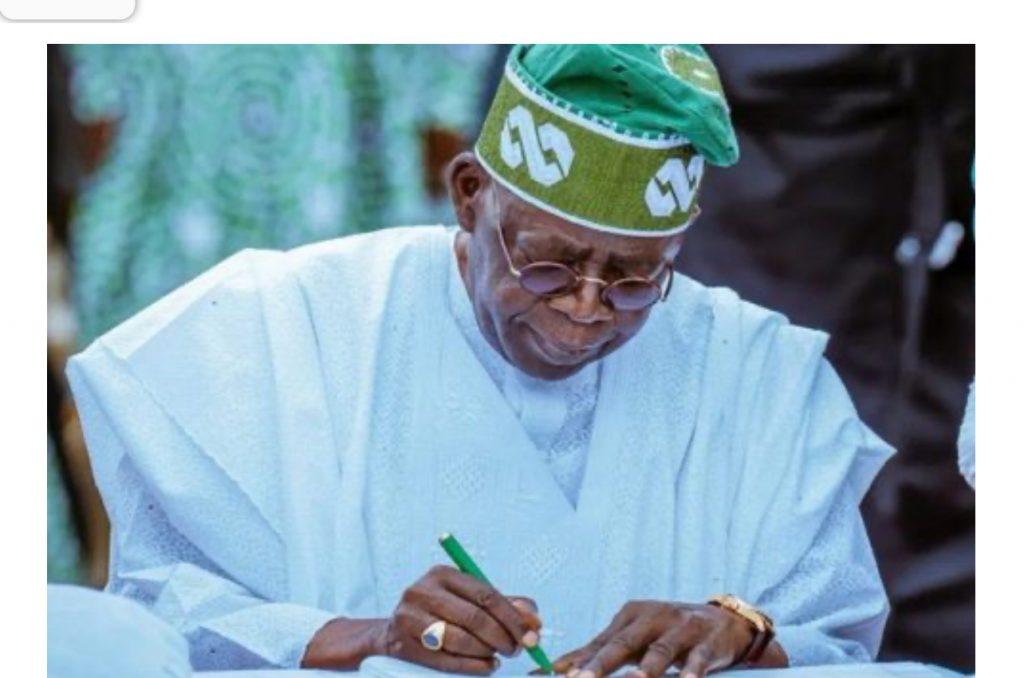
President Bola Tinubu has signed the Electoral Act 2026 (Amendment) into law, days after the Independent National Electoral Commission (INEC) released the timetable for the 2027 general elections.
The signing ceremony took place at the State House, Abuja, at about 5:00pm on Wednesday, with principal officers of the National Assembly in attendance.
The National Assembly had on Tuesday passed the Electoral Act 2026 (Amendment) Bill.
The latest amendment comes amid intense public debate over the electronic transmission of election results in real time.
Last week, protests erupted at the National Assembly complex as civil society organisations and opposition figures mounted pressure on lawmakers to mandate live transmission of results from polling units directly to INEC’s central server.
The protesters argued that real-time transmission would reduce result manipulation and strengthen public confidence in the electoral process.
However, the ruling All Progressives Congress (APC) and some stakeholders have raised concerns about the technical feasibility of live transmission, particularly in communities with weak telecommunications infrastructure. They have argued for a phased or hybrid approach that would allow manual collation where electronic systems fail.
news
EFCC Extends El-Rufai’s Stay in Custody Amid ₦432bn Probe
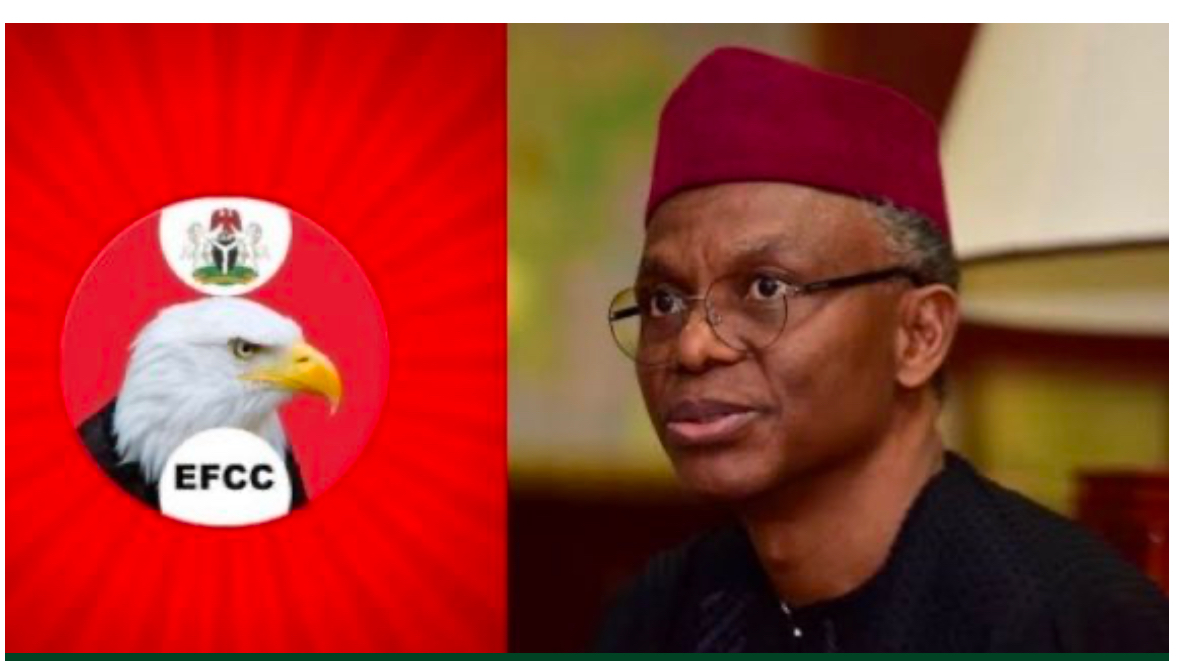
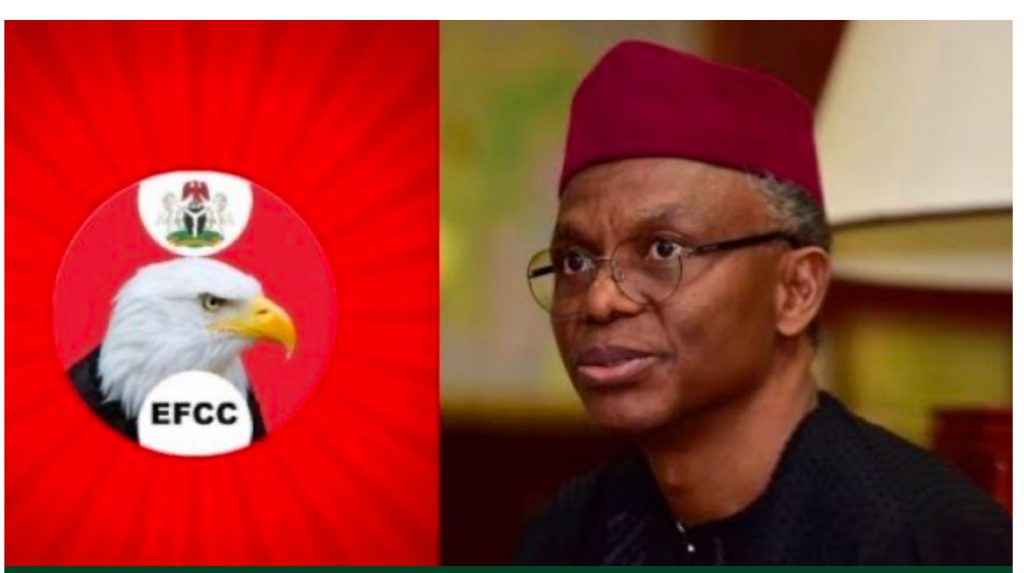
Former Kaduna State Governor, Nasir El-Rufai, on Tuesday spent the second night in the custody of the Economic and Financial Crimes Commission, as his lawyer, A.U Mustapha (SAN), pushes for his release on bail.
There are, however, indications that the commission may seek a remand order to extend his stay in custody to enable him to respond to questions posed by investigators handling his matter.
The former governor arrived at the EFCC headquarters in Abuja on Monday around 10 a.m. for questioning in connection with an alleged N432bn corruption probe. He was, however, detained at the commission, where investigators continued to grill him.
An official of the commission who pleaded anonymity said the anti-graft agency was considering obtaining a remand order after the expiration of the hours allowed by law to enable investigators conclude questioning him.
“Forget the speculations being peddled on social media that he has been released. He has not. El-Rufai is still with us and will be spending another night in custody.
“He is very much with us and will remain so because the investigators are considering getting a remand order after the expiration of the 48 hours allowed by law.
“The investigators need some time with him to answer questions arising from his eight years as governor in Kaduna State,” the source said.
Speaking in a telephone conversation with The PUNCH on Tuesday, El-Rufai’s counsel, Mustapha, confirmed that the former governor remained with the anti-graft agency, while insisting that his client had fully cooperated with investigators.
He described his client as a responsible citizen who is not a flight risk if granted bail.
Mustapha said, “Well, as a responsible citizen, he was invited and, true to his word, he honoured the invitation.
“As we speak, he is still with the EFCC. He is cooperating to the best of his capacity, and we hope that the EFCC, given its integrity, will be kind enough to admit him to bail because he is presumed innocent, and I am sure if he is granted bail, he will not jump bail.
“He is a responsible citizen, and everybody knows him. He came to Nigeria on his own volition. He wrote a letter that he was going to honour the EFCC invitation, and he kept his word as a man of integrity. We’re hopeful that very soon he will be granted bail.”
When asked about the specific allegations against his client, Mustapha declined to offer details.
“You’re asking the right question from the wrong person. That question can only be answered by the EFCC and not by me. I would just be speculating, and lawyers don’t do that.”
Pressed further on whether he witnessed parts of the interrogation and what it was about, Mustapha responded, “That would be prejudicial. It’s a confidential matter and not meant for public consumption.”
The EFCC’s interrogation is linked to the report of an ad hoc committee of the Kaduna State House of Assembly set up in 2024 to probe finances, loans, and contracts awarded between 2015 and 2023 during El-Rufai’s administration.
EFCC extends El-Rufai detention, Plateau indigenes killed, other top stories
Rep backs real-time electronic transmission of election results
The committee, chaired by Henry Zacharia, had alleged that several loans obtained during the period were not utilised for their intended purposes.
While presenting the report, the Speaker, Yusuf Dahiru Leman, claimed that about N423bn was allegedly siphoned under the former governor’s administration.
The committee recommended the investigation and prosecution of El-Rufai and some former cabinet members over alleged abuse of office, diversion of public funds, money laundering, contract awards without due process, and reckless borrowing.
The Assembly subsequently forwarded petitions to the EFCC and the Independent Corrupt Practices and Other Related Offences Commission.
El-Rufai has denied the allegations, describing the probe as politically motivated, and insisted that loans obtained during his tenure were properly appropriated and used for infrastructure, education, healthcare, and security.
On Monday, an EFCC source said the commission had been investigating the matter for about a year, noting that suspects are usually invited after investigations have reached an advanced stage.
“The commission has been investigating him for about a year now. As a commission, we don’t just rush to invite suspects. Persons accused are always the last; that is, after we might have done our investigation to an advanced stage.
“We are investigating him on the allegations against him by the Kaduna State Assembly,” the source said.
Meanwhile, in a separate development, the Department of State Services has filed criminal charges against El-Rufai before the Federal High Court in Abuja over alleged unlawful interception of the phone communications of the National Security Adviser, Nuhu Ribadu.
The three-count charge, marked FHC/ABJ/CR/99/2026, was filed under the Cybercrimes (Prohibition, Prevention, etc.) Amendment Act, 2024, and the Nigerian Communications Act, 2003.
According to the charge sheet, El-Rufai allegedly admitted during a February 13, 2026, appearance on Arise TV’s Prime Time Programme that he and unnamed associates unlawfully intercepted Ribadu’s communications.
Count One alleged that El-Rufai “did admit during the interview that you and your cohorts unlawfully intercepted the phone communications of the National Security Adviser, Nuhu Ribadu,” an offence said to be punishable under Section 12(1) of the Cybercrimes Amendment Act.
Count Two accused him of acknowledging knowledge of an individual involved in the alleged interception without reporting it to security agencies, while Count Three alleged that he and others still at large used technical equipment that compromised public safety and national security.
The prosecution further claimed that the alleged act, reportedly admitted during the television interview, caused “reasonable apprehension of insecurity among Nigerians.”
He is yet to be arraigned.
-

 news5 years ago
news5 years agoUPDATE: #ENDSARS: CCTV footage of Lekki shootings intact – Says Sanwo – Olu
-

 lifestyle6 years ago
lifestyle6 years agoFormer Miss World: Mixed reactions trail Agbani Darego’s looks
-

 health5 years ago
health5 years agoChairman Agege LG, Ganiyu Egunjobi Receives Covid-19 Vaccines
-

 lifestyle4 years ago
lifestyle4 years agoObateru: Celebrating a Quintessential PR Man at 60
-

 health6 years ago
health6 years agoUPDATE : Nigeria Records 790 new cases of COVID-19
-

 health6 years ago
health6 years agoBREAKING: Nigeria confirms 663 new cases of COVID-19
-

 entertainment1 year ago
entertainment1 year agoAshny Set for Valentine Special and new Album ‘ Femme Fatale’
-

 news9 months ago
news9 months agoBREAKING: Tinubu swears in new NNPCL Board


